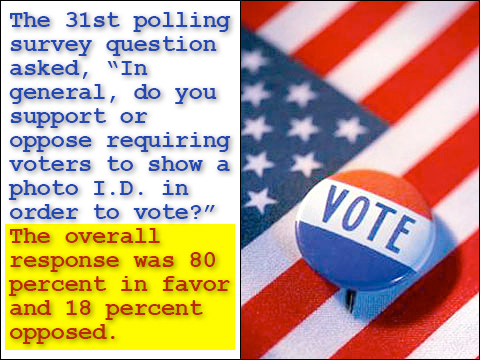By Jim Ellis
June 25, 2021 — New Jersey’s Monmouth University ran a national political survey (June 9-14; 810 US adults, live interviews) about the proposals being considered to change voting procedures at the national level and in many states. The result from several of the polling questions proved surprising.
As we know, the S.1/HR-1 legislation could not amass enough votes to invoke cloture against a Republican filibuster, thus killing it at least for a time. It is highly unlikely this measure could pass as currently written, but it is not out of the realm of possibility that another version of the voting bill will be considered later in the session. Additionally, election-oriented bills are alive in many states where legislatures have not yet adjourned for the year.
Monmouth tested the national sampling universe on a series of voting proposals and ideas, and their research effort may be one of the more extensive surveys published about the subject. Most of the responses were expected: people overwhelmingly favor enhanced mail voting, making the voting system more “user friendly”, and proof of identity.Perhaps the most onerous provision in the S.1/HR-1 concept was the national prohibition of election officials asking for identity proof. The main argument is that the voter ID procedures “suppress” minority turnout. Monmouth’s surprising result, however, finds their labeled category of minority voters actually support the ID requirement in a larger proportion than the non-Hispanic white respondents.
The 31st polling survey question asked, “In general, do you support or oppose requiring voters to show a photo I.D. in order to vote?” The overall response was 80 percent in favor and 18 percent opposed. Among those identified as Hispanic-Black-Asian-Other in the Monmouth crosstabs, the positive ratio rose to 84:13 percent.
This type of polling result shoots a major hole in the Democrats’ argument against the issue.
Their main opposition talking point is to suggest that many in the minority community cannot obtain an ID card, and thus the individual’s right to vote is suppressed, or denied. It is clear when analyzing this poll’s responses that a robust majority of these citizens don’t agree with such a characterization.
The other interesting crosstab for this question is from where the opposition to voter ID comes. According to this sample cell, the non-Hispanic white college-educated voters comprise the group professing the largest opposition to proof at the polls. Here, 65 percent of the group agrees that voter ID should be required at the polling place, but a full third of the segment, 33 percent, do not. There is no other segmented group that produces such a ratio.
The other two interesting questions involved whether the respondents believe voter fraud is a problem, and if people are being denied their right to vote. In both instances, we see large majorities answering affirmatively.
Overall, 69 percent of the people think voter fraud is either a major (37 percent) or minor (32 percent) problem. Similarly, 76 percent believe some form of voter disenfranchisement also exists, with 50 percent saying this is a major problem and 26 percent believing it exists to a minor degree.
In the former area, we see all but Democrats and self-identified liberals not seeing voter fraud as at least a minor problem. Conservatives are the group believing that fraud is a major problem (61 percent), more than double those who believe it is minor (27 percent). Only 10 percent believe there is no problem. On the other end of the spectrum, 56 percent of liberals perceive no voter fraud problem, with only 17 percent believe the situation is of major consequence.
Here, too, as with the voter ID response, the minority voting segment believes voter fraud is a more serious problem than do the non-Hispanic whites. A total of 73 percent of the minority contingent believe voter fraud is a major (39 percent) or minor (34 percent) problem, while the white voter comes in at 67 percent (36 percent major; 31 percent minor).
On the other hand, white voters profess that voter disenfranchisement is a slightly worse problem than minorities, in a combined 77 to 75 percent split, though more minorities (52 percent) believe disenfranchisement is a major problem than whites (49 percent).
Few current issues are as unanimously definitive as voting procedures, especially in terms of what the majority of people express as their remedy for change. More access, an easier voting system, but one that is consistently verified are the points of foremost agreement within the entire electorate.

